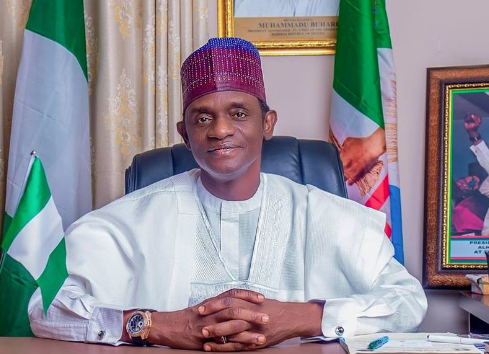Governor Mai-Mala Buni has urged the United Nations and other donor agencies to increase their support and humanitarian interventions to complement the state government’s efforts of accelerating resettlement and reconstruction of the internally displaced persons in the state.
The governor made the urge on Wednesday in Abuja while speaking at the United Nations program tagged ‘Holding On’ to mark 10 years of Boko Haram insurgency.
Mr Buni said: “With the relative improvement in the security situation across the state, I believe our partners have a chance to come in more forcefully now and continue to support our post-conflict initiatives.”
The governor listed the post-conflict initiatives of the state government to include the provision of basic services, such as water and hygiene, and electricity and rebuilding of basic infrastructure.
Other are action to stabilize the security environment; protection for vulnerable groups and households; support for affected persons as they begin to re-build their lives, and; support for community peace building and resilience activities.
Mr Buni noted that more than seven million people in Borno, Adamawa and Yobe States still stand in need of humanitarian assistance, explaining that Boko Haram is responsible for the worse humanitarian crisis in the history of the North-East.
“The displacement of people from their communities also affects their capacity to engage in meaningful economic activity, including farming. This, in turn, has worsened a food security situation that clearly pre-dated Boko Haram,” he said.
The governor observed that even before Boko Haram, the North-East was going through trying times and that the insurgency clearly aggravated the situation.
“The North-East region reportedly has the lowest indices of development relative to the rest of Nigeria, particularly in healthcare, education, and infrastructure.
“Many believe that poverty, joblessness and ignorance are part of the factors that gave rise to the Boko haram insurgency in the first place,” he noted.
Mr Buni added that in spite of the enormity of the challenges, the state government, with the support of the federal government and development partners, has continued to do its best to help the victims of the insurgency to recover and rebuild their lives.
“As a result of these efforts, we have now moved beyond a humanitarian assistance situation to reconstruction, rehabilitation and resettlement phase,” he added.
The governor observed, however, that reconstruction and resettlement, “are clearly the most challenging for us in Yobe State, given the enormity of the devastation to our infrastructure and our capacity for service delivery.”
He, therefore, urged the UN and its agencies as well as other donor organisations to do more to help the process.
Earlier in his remark, the United Nations Resident Humanitarian Coordinator, Edward Kallon said that ‘Holding On’ was organised to “honour the souls whose lives have been claimed by this crisis…(and to express our) grave concern for the hundreds of thousands of people who are still trapped in areas we cannot reach to provide them urgent lifesaving humanitarian assistance they so desperately need”.
Mr Kallon paid tribute to those who continue to put their lives in the line to help the victims of the insurgency, reminding those who gathered for the event that “humanitarian crisis is far from over”.
The UN official noted that through humanitarian support efforts, up to five million people in the North-East “had food on their plates” while two million Nigerians who were internally displaced “have found safe refuge in camps managed together by humanitarian and state agencies.
“The solution to the crisis in North-East Nigeria is peace and must work together to bridge the humanitarian, development, peace and security nexus in search of a durable solution to the crisis”, Mr Kallon said.






